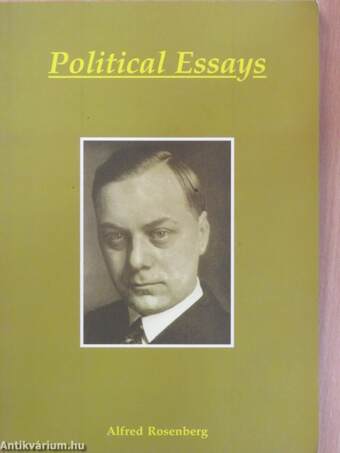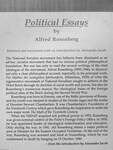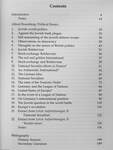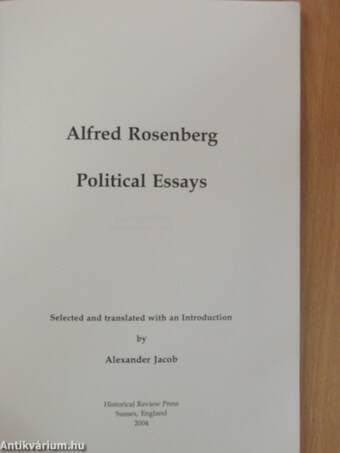1.067.715
kiadvánnyal nyújtjuk Magyarország legnagyobb antikvár könyv-kínálatát

VISSZA
A TETEJÉRE
JAVASLATOKÉszre-
vételek
Political Essays
| Kiadó: | Historical Review Press |
|---|---|
| Kiadás helye: | Sussex |
| Kiadás éve: | |
| Kötés típusa: | Ragasztott papírkötés |
| Oldalszám: | 152 oldal |
| Sorozatcím: | |
| Kötetszám: | |
| Nyelv: | Angol |
| Méret: | 21 cm x 15 cm |
| ISBN: | 0-906879-42-6 |
naponta értesítjük a beérkező friss
kiadványokról
naponta értesítjük a beérkező friss
kiadványokról
Fülszöveg
Political Essays
by
Alfred Rosenberg
Selected and translated with an introduction by Alexander Jacob
The National Socialist movement has hitherto been dismissed as an
ad-hoc racialist movement that had no serious political philosophical
foundation. But one has only to read the several writings of the chief
ideologue of the movement, Alfred Rosenberg (1893-1946), to discover
not only a clear philosophical account, especially in his principal work,
Der Mythus des zwangisten Jahrhunderts, (München, 1930) of what the
regenerative movement of National Socialism sought to achieve in the
Third Reich through its doctrine of racial worth and power, but also (in
Rosenberg's numerous essays) the ideological bases of the foreign
political aims of the Reich during the Second World War.
Rosenberg was born in Estonia, one of the Baltic provinces of Russia,
and his youth was steeped in studies of the Nordic sagas and the works
of Houston Stewart Chamberlain. It was Chamberlain's... Tovább
Fülszöveg
Political Essays
by
Alfred Rosenberg
Selected and translated with an introduction by Alexander Jacob
The National Socialist movement has hitherto been dismissed as an
ad-hoc racialist movement that had no serious political philosophical
foundation. But one has only to read the several writings of the chief
ideologue of the movement, Alfred Rosenberg (1893-1946), to discover
not only a clear philosophical account, especially in his principal work,
Der Mythus des zwangisten Jahrhunderts, (München, 1930) of what the
regenerative movement of National Socialism sought to achieve in the
Third Reich through its doctrine of racial worth and power, but also (in
Rosenberg's numerous essays) the ideological bases of the foreign
political aims of the Reich during the Second World War.
Rosenberg was born in Estonia, one of the Baltic provinces of Russia,
and his youth was steeped in studies of the Nordic sagas and the works
of Houston Stewart Chamberlain. It was Chamberlain's Foundations of
the Nineteenth Century which gave Rosenberg the inspiration to write his
own major work The Myth of the Twentieth Century
When the NSDAP acquired full political power in 1933, Rosenberg
was given nominal control of the Party's Foreign Policy Office. In 1934,
he was appointed leader of ideological indoctrination and education.
Only during the war, in 1941, did Rosenberg obtain a major political
post as Minister for the Eastern Occupied Territories. At the end of the
war, Rosenberg was arrested and tried at Nuremberg, where he was
condemned to death by hanging on 15 October, 1946.
- from the introduction by Alexander Jacob Vissza
Témakörök
- Történelem > Társadalomelmélet
- Idegennyelv > Idegennyelvű könyvek > Angol > Művelődéstörténet
- Idegennyelv > Idegennyelvű könyvek > Angol > Történelem > Egyéb
- Művelődéstörténet > Eszmetörténet > Történelem > Politika
- Művelődéstörténet > Átfogó művek, tanulmányok
- Filozófia > Témaköre szerint > Tanulmányok, esszék
- Idegennyelv > Idegennyelvű könyvek > Angol > Filozófia > Témaköre szerint > Tanulmányok, esszék
- Történelem > Idegennyelvű > Angol
- Filozófia > Témaköre szerint > Társadalomfilozófia > Egyéb
- Idegennyelv > Idegennyelvű könyvek > Angol > Filozófia > Témaköre szerint > Társadalomfilozófia > Egyéb
- Történelem > Politika > Ideológiák > Fasizmus
- Történelem > Politika > Ideológiák > Kommunizmus > Egyéb
- Történelem > Tanulmányok
Alfred Rosenberg
Alfred Rosenberg műveinek az Antikvarium.hu-n kapható vagy előjegyezhető listáját itt tekintheti meg: Alfred Rosenberg könyvek, művekMegvásárolható példányok
Nincs megvásárolható példány
A könyv összes megrendelhető példánya elfogyott. Ha kívánja, előjegyezheti a könyvet, és amint a könyv egy újabb példánya elérhető lesz, értesítjük.







